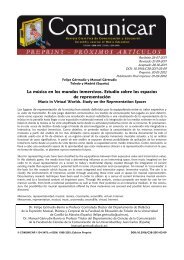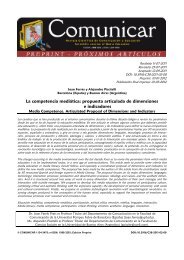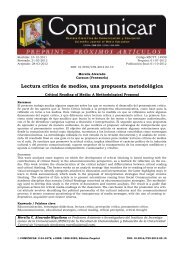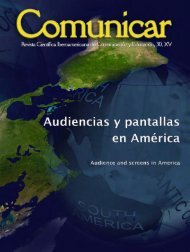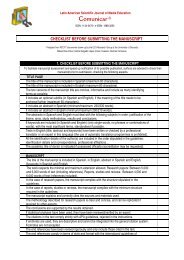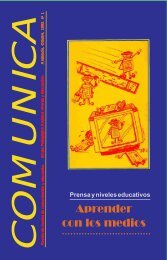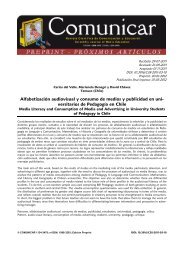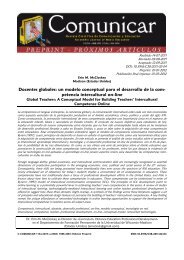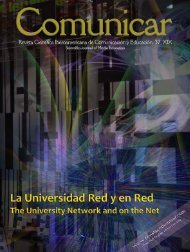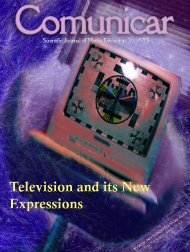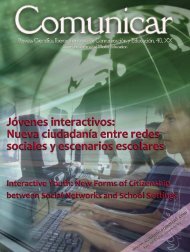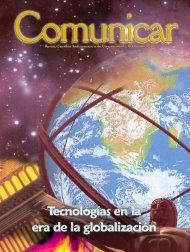Comunicar 39-ingles - Revista Comunicar
Comunicar 39-ingles - Revista Comunicar
Comunicar 39-ingles - Revista Comunicar
You also want an ePaper? Increase the reach of your titles
YUMPU automatically turns print PDFs into web optimized ePapers that Google loves.
49students, going without media for 24 hours rippedback the curtain on their hidden loneliness. «When Icouldn’t communicate with my friends» by mobilephone, reported a student from China, «I felt so lonelyas if I was in a small cage on an island». And the problemsfor some students went beyond loneliness.Some came to recognize that ‘virtual’ connections hadbeen substituting for real ones – their relationship tomedia was one of the closest «friendships» they had.Wrote a student from Chile: «I felt lonely withoutmultimedia. I arrived at the conclusion that media is agreat companion».4) Students reported that being tethered to digitaltechnology 24/7 is not just a habit, it is essential to theway they construct and manage their friendships andsocial lives. The leading social media site across all fivecontinents in the study was Facebook. Students reportedthat how they use social media shapes how othersthink of them and how they think about themselves.«There is no doubt that Facebook is really high profilein our daily life», said a student from Hong Kong.«Everybody uses it to contact other persons, also weuse it to pay attention to others».5) Many students said that although they knewthey could be distracted at times, they hadn’t been fullyaware of how much time they committed to social networkingand how poorly they actually were able tomultitask. «I usually study and chat or listen to music atthe same time so I won’t be bored and feel asleep»,wrote a student from Lebanon. «But what I mainlyrealized is that… when you really get off the mediayou realize… how many quality things you can do».6) Students noted they use different communicationtools to reach different types of people. Studentscan simultaneously be on multiple communicationplat forms, but in different ways: They call their mothers,they text and Skype Chat close friends, theyFace book with their social groups, they email theirprofessors and employers. Students consider and sortthrough all these permutations automatically, but theimplications are real for how they construct their personasand social networks.7) Most students reported that they rarely searchfor «hard» news at mainstream news sites. Instead theyinhale, almost unconsciously, the news that is servedup on the sidebar of their email account, on friends’Facebook walls, and on Twitter. Because social mediaare increasingly the way students reported getting theirnews and information, very few students mentionedany traditional news outlets by name.8) Many students noted some benefits to theirmedia-free exercise: a sense of liberation or freedom,a feeling of peace and contentment, better communicationwith close friends and family, and more time todo things they had been neglecting. Rarely, but incases across the globe, students expressed a desire toset aside time to go media-free again in the future.9) Some students commented on the positive qualitativedifferences in even close relationships duringthe period they went unplugged. «I interacted with myparents more than the usual», reported a student inMexico. «I fully heard what they said to me withoutbeing distracted with my BlackBerry. I helped to cookand even to wash the dishes». A student from the U.S.wrote: «I’ve lived with the same people for three yearsnow, they’re my best friends, and I think that this is oneof the best days we’ve spent with together. I was ableto really see them, without any distractions, and wewere able to revert to simple pleasures».4. DiscussionThe primary value of conducting a «24 hours with -out media» assignment is in the increased self-awarenessstudents gain with regard to the role of media intheir lives. Self-awareness is fundamental to em -powerment – in order to understand how to make responsibleuse of the Internet, students must first becomeaware of their own usage patterns and behaviors.Thus, the assignment addresses the learning objectivesof Unit 1 of Module 7 of the UNESCO curriculum byhelping teachers understand the Internet usage patternsand interests of students, developing teachers’ability to help young people use the Internet responsibly,and prompting students to themselves becomemore aware of the opportunities, challenges and risksthe Internet provides.Module 7, «Internet Opportunities andChallenges», opens by stating that «Taking part in theinformation society is essential for citizens of all agegroups». It is often assumed that young people –considered«digital natives» who grew up in a wired world–are fully aware of their own media habits, as well as thebenefits and pitfalls of living in an information society. AsModule 7 notes, this is not the case. Young people,while being able to benefit both from the resources availableon the Internet and the ever-growing roster ofweb-enabled mobile devices, remain a vulnerablepopulation. But rather than advocating a protectionistapproach, UNESCO’s Curriculum rightly suggests that«The best way to help them stay out of harm’s way is toempower and educate them on how to avoid or managerisks related to Internet use» (UNESCO 128).The «Unplugged» study has added a global perspectiveto the growing body of literature on the media<strong>Comunicar</strong>, <strong>39</strong>, XX, 2012© ISSN: 1134-3478 • e-ISSN: 1988-3293 • Pages 45-52



